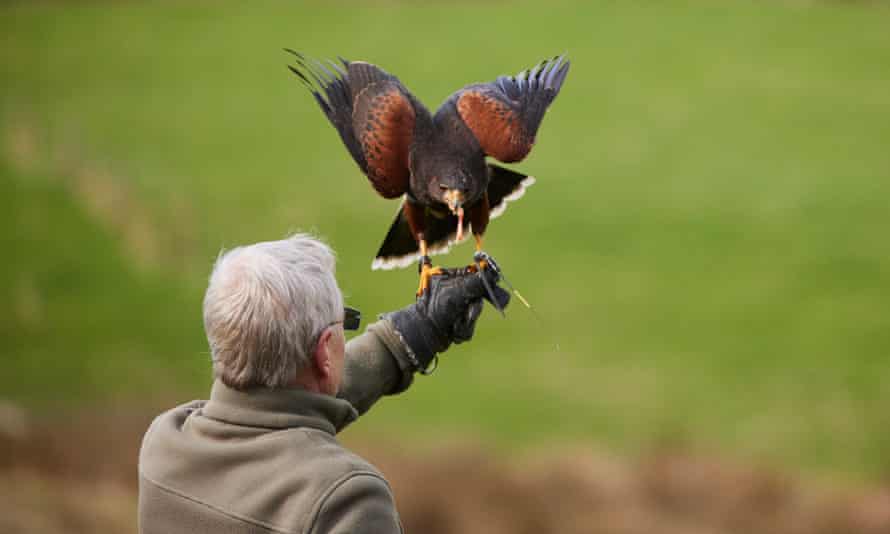
For nearly 30 years, Mitch Law went to work in the same office – four metres square, with a window that overlooked a car park. As an IT manager in Warrington, he wasn’t isolated. Besides, his wife Bernice was a colleague. But Law spent his working life tethered to a desk in a room like a box.
When they both applied for redundancy, Bernice was turned down. “But for me, they went, ‘Mitch, oh right, 28 years – yeah, byeee!’”
He must think of his tiny office when he is flying Chokky, the Harris hawk he bought in 2019, when he was 65. “I walk up a bit of a ridge. The west wind’s coming. He goes out of sight and then slowly works his way back, working the wind, until he hovers above me, hanging in the wind, looking down at me. When he lands on my glove you can hardly feel him, he’s so soft. I never get sick of it.”
Law had no family history of falconry, but when Bernice retired five years later, it spurred him to action. “That’s when I realised that she was going to catch me doing nothing all day. I thought, what shall I do?
“I rang up our local falconry and asked if they wanted any volunteers. They said, ‘Come along on Monday.’” It must have felt strange turning up as a novice; he had been there only once, when Bernice gave him a falconry experience for his 50th birthday. “The first thing you get shown is cleaning. Sixty birds – that’s a lot of poo.”
Next he learned to tie the jesses, to secure the birds to the glove. He practised the “falconer’s knot” at home on the bathroom towel-holder. “Slowly I gained knowledge and I never stopped learning. The contrast between being in that office – centrally heated, nice and warm, cup of tea – to going out every morning – rain, shine, cold … It was invigorating.”
After five years as a volunteer, he bought Chokky. For the first two weeks, the hawk would not eat. Law sat in the dark in Chokky’s mews (as falconers call their birdhouses), with the bird on his fist. After a few days, he let in light. Next, he took Chokky to the kitchen; they would sit watching telly. Law feared the hawk “would die of dehydration”. Then, one day, Chokky gobbled the food Law offered him; two days later he hopped from the gatepost to Law’s glove. Within a week, he was flying free.
“Harris hawks just get it. In the wild they hunt in family packs,” and work well with people because of that, Law says.
Law describes himself as a doer; management profile tests have told him this. Before retiring, he tried flying model aircraft, canoeing, kickboxing, surfing and golf. His father was a doer too, “a very accomplished man” who hand-built boats and flew model aircraft at the same club Law later attended.
He had left home at 17 “because of friction” between them. He tried lots of jobs, from deep-sea trawling to wire drawing, working in shops, factories and warehouses, before discovering his talent for computer programming.
“Men have to leave home, make their own way and come back to appreciate their dads,” Law says. In adulthood, he and his father became close.
Unlike the myriad pursuits he had tried before, “Falconry was something I loved immediately and stuck with,” he says. “I know Dad would have absolutely loved it and joined me.
“I sometimes say to Bernice, ‘Let me work this out again. Am I 68?’” It doesn’t seem long since he used to wonder, as older colleagues celebrated their 40th birthdays, “What are they going to do now they are so old?”
Chokky is likely to live about 25 years, Law says. “He will probably out-see me. So that will be my future as a falconer. And I know in my heart I will always love it.”
Climbing the ridge to release the hawk is beginning to feel like hard work – Law is “not in great health” now – but nothing will stop him from flying Chokky. “When I get to a point where I can’t hop over that gate and get up that ridge, I’ll fly him out of the tree in my garden.”



